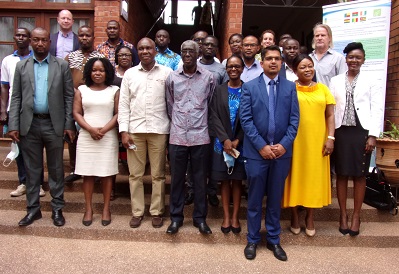A three-day capacity building workshop, which seeks to adopt environmentally sustainable solutions to resolving water and climate change related challenges in countries along the Volta Basin, has opened in Accra, yesterday.
The basin, approximately 400,000km2 across six countries; Benin, Burkina Faso, Cote d’Ivoire, Ghana, Togo and Mali, serves as a major natural resource in sustaining livelihoods and promoting economic development among member-countries.
The “Nature-Based Solutions” workshop thus drew participants, including representatives of hydrological and meteorological services, environmental protection agencies, civil society and funding partners from member states, to develop ‘bankable’ projects that can be implemented on a sub-regional and national scale to save the Volta Basin.
It forms part of a five-year “Integrating Flood and Drought Management and Early Warning for Climate Change Adaptation in the Volta Basin (VFDM)” project, funded by the Climate Change Adaptation Fund, to reduce extreme hydro-climatic disaster risks in the beneficiary communities.
In a speech read on her behalf, the Minister of Sanitation and Water Resources, Cecelia Abena Dapaah, decried the increasing scarcity of water due to harmful human and environmental activities.
She said about 65 percent of Ghana’s natural wetlands had been lost as a result of human activities thereby drastically reducing the country’s water storage capacity and quality.
The minister, who is also Chairman of the Volta Basin Authority (VBA) Council of Ministers on the VFDM project, said it was the spate at which water was becoming a rare commodity that Ghana was committed to implementing the VFDM to adopt pragmatic actions that encourages “reforest of our degraded river banks, restoration of our wetlands, reconnect our rivers and flood plains to promote recession agriculture to improve livelihoods.”
Ms Dapaah mentioned that aside forging the needed partnership to conserve water resources, government was implementing a “Buffer Zone Policy” to guide the pragmatic and coordinated creation of vegetative buffers for the preservation and functioning of water bodies and vital ecosystems while providing economic benefits for the populace.
“I wish to reassure the Adaptation Fund and the Project Partners that we will spare no efforts in contributing to the implementation of the projects that will be identified and developed,” she stated.
The Executive Director of the VBA, Mr Serge Traore, in a speech read on his behalf, said the adoption of “nature-based solutions” provided a novel and environmentally promising option to tackling climate change.
“Adopting or rather putting this method into practice is a highly important issue in our environment and I would like to humbly ask various partners and stakeholders involved in the project implementation of the absolute necessity to draw on the nature-based approach.
This will build the required capacity in the prediction, early warning and management of floods and drought in the Volta Basin to preserve the biophysical, functions and integrity of the water resources and associated ecosystems,” he noted.
The Executive Secretary, Mr Serge Traore, asked the participants to understand the responsibility towards the use, protection and conservation of water and the other natural resources.
BY ABIGAIL ANNOH AND IGNATIUS AWUAH TANOE BLAY

